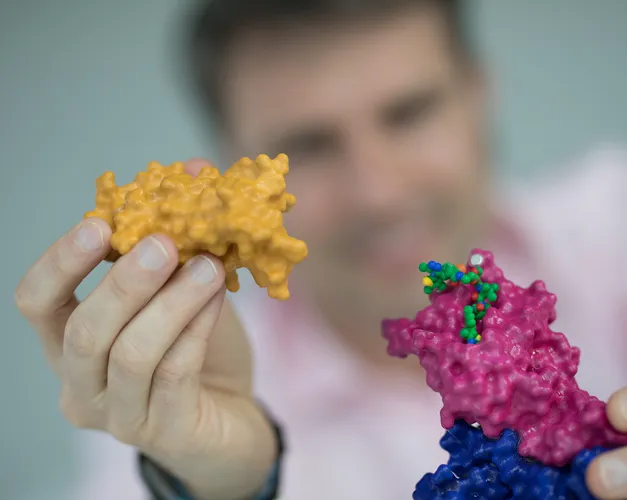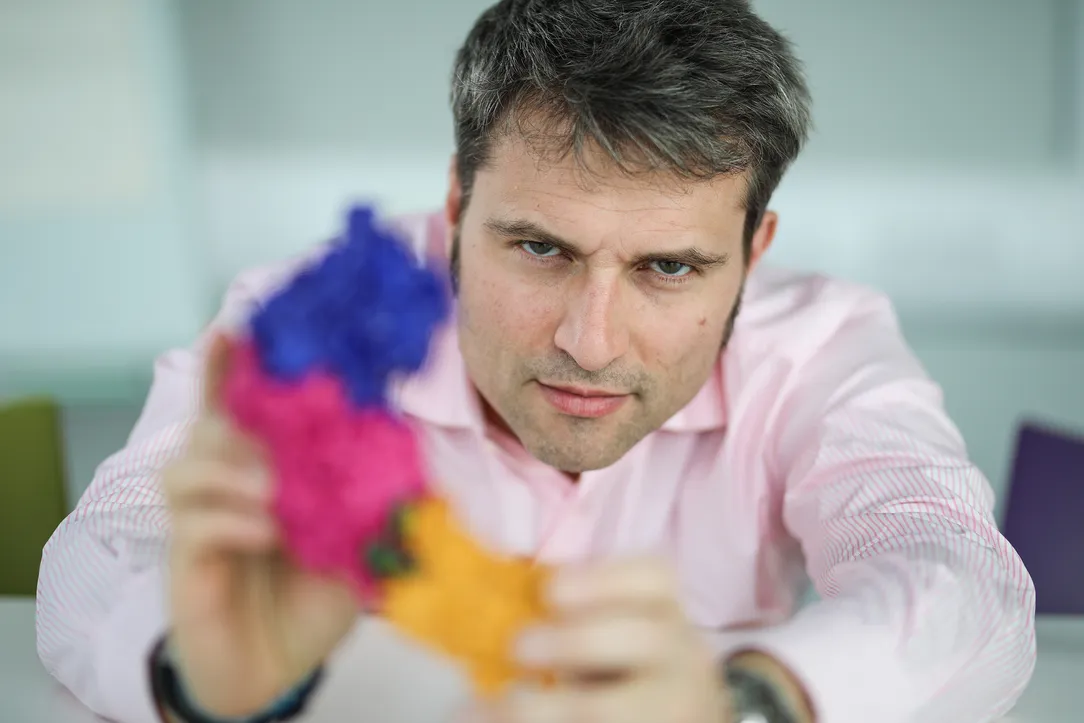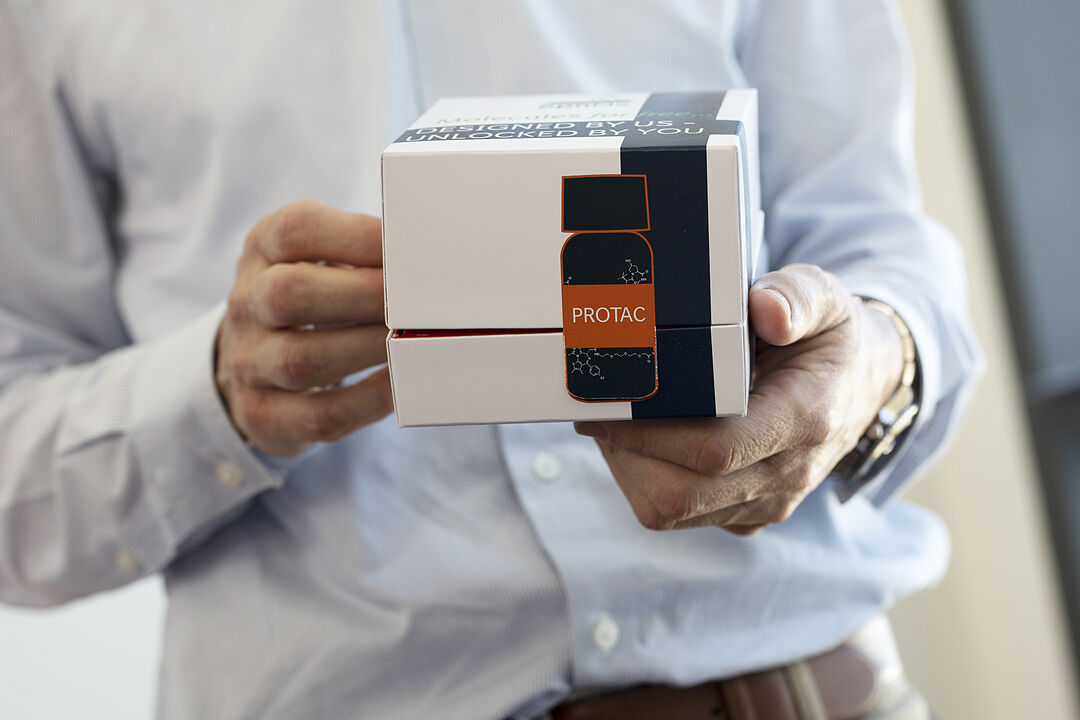Feature
Collaboration with Boehringer Ingelheim
A world-changing idea: the development a completely new class of drugs with the potential to "drug the undruggable"
Published on 28 May 2020

A partnership between pharmaceutical giants Boehringer Ingelheim (BI) and the University of Dundee has broken into new industry territory with a world-changing goal: the development of proteolysis targeting chimaeras (PROTACs), a completely new class of drugs with the potential to "drug the undruggable".
Background
The collaboration brings together the expertise of Professor Alessio Ciulli, one of the pioneers in the field of PROTACs, based in the School of Life Sciences at the University of Dundee, with Boehringer Ingelheim’s pharmaceutical expertise and commitment to bring innovative medicines to patients with cancer. Family-owned since it was established in 1885, Boehringer Ingelheim is one of the pharmaceutical industry’s top 20 companies.
After a decade of minor advances since conceptualisation recent discoveries from the Ciulli group and other labs have enabled the universal applicability of this approach, although the design of novel therapeutics remains challenging.
Boehringer Ingelheim, Vienna
PROTACs represent a new class of drug candidates with the potential to tackle compelling cancer targets which have failed traditional medicinal chemistry approaches. Designed to harness the natural protein disposal system of the cell (the ubiquitin-proteasome) PROTACs remove disease-causing proteins in the cell. The fundamental difference between PROTACs and conventional drugs is that conventional small molecule drugs typically block target proteins whereas PROTACs actually destroy them. This break-through discovery presents a potentially more efficacious way to treat cancer.

Professor Alessio Ciulli, University of Dundee
Challenge
Since the partnership’s initiation in 2016 and expansion in 2018, the application of PROTACs has grown dramatically. However, designing PROTACs remains challenging, hindering faster progress in the field.
Solution
The partners have developed a structure-based design approach as a solid basis to accelerate further development. In addition, to boost PROTAC research around the world, in 2018 Boehringer Ingelheim made the protein degrader compound MZ-1, developed at the University, freely available through its opnMe portal.
The opnMe portal provides free and open access to selected molecules for the scientific community aiming at accelerating research initiatives that can benefit patients with high unmet medical need.Further PROTAC compounds, VZ185 and cis-VZ185, developed by the Ciulli lab have been added recently and they join the joint Dundee-BI’s SMARCA2/4 degrader ACBI1 on the portal.
The BI-Dundee team has reported recent progress in a number of scientific publications, including most recently in the journal Nature Chemical Biology. This publication highlights their approach to use 3-dimensional pictures at atomic resolution to design highly potent and selective drug candidates.
This new approach has yielded the first PROTAC which shreds SMARCA2, a protein that drives the tumours of more than 20,000 new patients with cancer each year and for which drug discovery approaches have otherwise been unsuccessful to date.
This publication is an example of how the detailed understanding on how PROTACS work can be translated towards effectively tackling previously "undruggable" targets. It marked a key milestone in the development of the alliance and enables the joint team to drive the next phase of degrading highly-prized cancer targets previously intractable via other approaches.
Professor Ciulli, University of Dundee
Outcomes

PROTAC compounds developed at the University of Dundee are now being made available free of charge by BI
- The team approach yielded the first PROTAC which shreds SMARCA2, a protein that drives the tumours of more than 20,000 cancer patients each year and for which other drug discovery approaches have been unsuccessful to date.
- Proteolysis-targeting chimera (PROTAC) compounds developed solely at the University of Dundee and as part of the BI-Dundee collaboration are now being made available free of charge by BI through their scientific crowdsourcing platform opnMe.com. The opnMe portal provides free and open access to selected molecules for the scientific community aiming at accelerating research initiatives that can benefit patients with high unmet medical need. https://opnme.com/molecules/ptk2-protac-bi-3663
- The joint team has reported recent progress in a number of scientific publications, including most recently in the journal Nature Chemical Biology (DOI: http://dx.doi.org/10.1038/s41589-019-0294-6).
- The collaboration not only builds on recent ground-breaking work of Professor Ciulli and his team, but also benefits from top facilities and expertise available within the School of Life Sciences at Dundee, renowned for innovative industry-collaborations.
- Boehringer Ingelheim has described the PROTACs discovery collaboration at the University of Dundee as the "model" for how they want academia -industry partnerships to work.
Professor Julian Blow, Vice-Principal (Academic Planning and Performance)
Press Office, University of Dundee
[email protected]